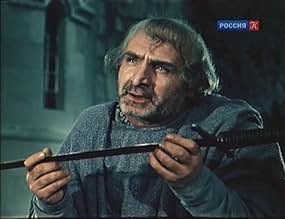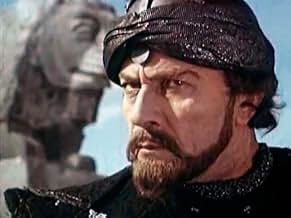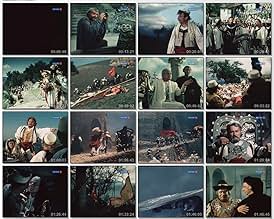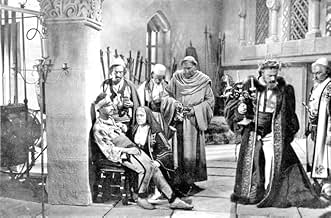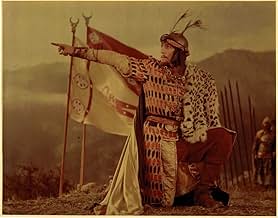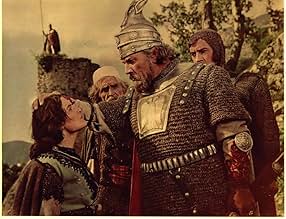Agrega una trama en tu idiomaThis is the true story of the National Hero of Albanians, George Kastrioti Scanderbeg, from his birth to his death. 1405-1468. Based mainly upon the monk writer Marin Barleti, the movie star... Leer todoThis is the true story of the National Hero of Albanians, George Kastrioti Scanderbeg, from his birth to his death. 1405-1468. Based mainly upon the monk writer Marin Barleti, the movie starts off with how the boy Scanderbeg was taken hostage by the ottoman turks and trained from... Leer todoThis is the true story of the National Hero of Albanians, George Kastrioti Scanderbeg, from his birth to his death. 1405-1468. Based mainly upon the monk writer Marin Barleti, the movie starts off with how the boy Scanderbeg was taken hostage by the ottoman turks and trained from them until he became one of the most outstanding warriors of the Ottoman Empire, then lat... Leer todo
- Premios
- 2 premios ganados y 1 nominación en total
- Dafina
- (as Veriko Andjaparidze)
- Dirección
- Guionista
- Todo el elenco y el equipo
- Producción, taquilla y más en IMDbPro
Opiniones destacadas
He was distinguished as one of the best officers in several Ottoman campaigns both in Asia Minor and in Europe, and the Sultan appointed him General. He even fought against Greeks, Serbs and Hungarians, and some sources says that he used to maintain secret links with Raguse, Venice, Vladislas of Hungary et Alphonse V of Naples. Sultan Murat II gave him the title Vali which made him the General Governor of some provinces in central Albania. He was respected everywhere but he missed his country.
In 1443, during the battle against the Hungarians of Hunyadi in Nish (in present day Serbia), he abandoned the Ottoman Army and captured Kruja, his father's seat in middle Albania. Above the castle he rose the Albanian flag, a red flag with the black double-headed eagle, the present-day Albanian flag, and pronounced to his countrymen the famous words: "I have not brought you liberty, I found it here, among you". He managed to unite all Albanian princes at the town of Lezha (League of Lezha, 1444) and united them under his command to fight against the Turks.
During the next 25 years he fought, with forces rarely exceeding 20,000 against the most powerful army of that time and defeated it for 25 years. In 1450 the Turkish army was led by the Sultan Murad II in person, who died after his defeat in the way back. Two other times, in 1466 and 1467, Mehmed II, the conqueror of Constantinople, led the Turkish army himself against Skenderbeg and failed too. The Ottoman Empire attempted to conquer Kruja 24 times and failed all 24 of them.
Skenderbeg's military successes evoked a good deal of interest and admiration of the Papal state, Venice and Naples, themselves threatened by the growing Ottoman power across the Adriatic. The Albanian warrior played his hand with a good deal of political and diplomatic skill in his dealings with the three Italian states. Hoping to strengthen and expand the last Christian bridgehead in the Balkans, they provided Skenderbeg with money, supplies and occasionally with troops. One of his most powerful and consistent supporters was Alfonso the Magnanimous (1416-1458), the Aragone king of Naples, who decided to take Skenderbeg under his protection as vassal in 1451, shortly after the latter had scored his second victory against Murad II. In addition to financial assistance, the King of Naples undertook to supply the Albanian leader with troops, military equipment as well as with sanctuary for himself and his family if such a need should arise.As an active defender of the Christian cause in the Balkans, Skenderbeg was also closely involved with the politics of four Popes, one of them being Pius II (1458-1464) or Aeneas Sylvius Piccolomini, the Renaissance humanist, writer and diplomat.
Profoundly shaken by the fall of Constantinople in 1453, Pius II tried to organise a new crusade against the Turks; consequently he did his best to come to Skenderbeg's aid, as two of his predecessors Nicholas V and Calixtus III, had done before him. This policy was continued by his successor, Paul II,(1464-1473).They gave him the title Athleta Christi.
For a quarter of a century he and his country prevented Turks from invading Catholic Western Europe.
After his death from natural causes in 1468 in Lezha, his soldiers resisted the Turks for the next 12 years. In 1480 Albania was finally conquered by the Ottoman Empire. When the Turks found the grave of Skenderbeg in Saint Nicholas church of Lezha, they opened it and held his bones like talismans for luck. In 1480 the Turks invaded Italy and conquered the City of Otranto.
Skenderbeg's posthumous renown was by no means confined to his own country. Voltaire thought the Byzantine Empire would have survived had it possessed a leader of his quality. A number of poets and composers have also drawn inspiration from his military career. The French sixteenth-century poet Ronsard wrote a poem about him and so did the nineteenth-century American poet Longfellow. Antonio Vivaldi, too, composed an opera entitled Scanderbeg.
Skenderbeg today is the National Hero of Albania. Many museums and monuments are raised in his honour around Albania, and among them the Museum of Skenderbeg in his famous castle in Kruja.
Bibliography: Noli, Fan S.: George Castrioti Scanderbeg, New York, 1947 Logoreci, Anton: The Albanians, London, 1977
Gjergj Kastrioti Skenderbeu (1405 - January 17 1468), better known as Skanderbeg, is the most prominent figure in the history of Albania. He is also known as the Dragon of Albania and is the national hero of the Albanians. He is remembered for his struggle against the Ottoman Empire, through the work of his first biographer, Marin Barleti.
The movie definitely needs a remake or something like this because it was shot in '53 and most of cast is Russian or Romanian or Belgian as far as i remember. (this is due to strong communist friendship with them) The movie quality is poor, sound also. (even though it has a magnificent score performed by the national radio television orchestra)
Biography
Gjergj Kastrioti Skenderbeu (1405 - January 17 1468), better known as Skanderbeg, is the most prominent figure in the history of Albania. He is also known as the Dragon of Albania[1] and is the national hero of Albanians. He is remembered for his struggle against the Ottoman Empire, through the work of his first biographer, Marin Barleti.
In English, his names have variously been spelled: George, Gjergj, Giorgio; Castriota, Kastrioti, Castrioti, Castriottis, Kastriotes, Castriot, Kastriot; Skanderbeg, Scanderbeg, Skenderbeg, Skanderbeu, or Scander-Begh.
His father was a lord of the Kastriotis family. Gjon Kastrioti[5], descended from an ancient family from Mat, and controlled a principality including Mat, Krujë, Mirditë and Dibër.[6]. Voisava, Skanderbeg's mother, was from the Tribalda family[5], a princess[7] from Polog valley[8]. Although he fought in the service of the Ottoman Empire, Skanderbeg soon switched sides and fought against the Ottoman Empire until the time of his death.
IT IS NOT THE TOOL BUT THE CRAFT - ROLAND EMMERICH
We had Troy, Alexander and even Hercules, now it's time to write about the great Scanderbeg and how he saved Europe from the Ottoman threat by fighting with them alone(with minor support from the Pope) for more then 25 years.
This is a must see movie, I don't know if they have managed to put subscripts, but the music is certainly amazing, and considering hat this was done with the help of the russians because albania was too poor to afford such a movie I think that overall for the time, for the knowledge we had about Scanderbeg, or I should say the widespread common knowledge that we had about him, this is truly a remarkable movie with it's artistic elements.
The guy who plays Scanderbeg is also the best match they could find. I'm sure the counterpart of him would be Russell Crow today.
There are a few problems with this film, however. Some of the major complaints I've seen have been about some of the acting, dialogue, and one-dimensional characters. Additionally, I should note that the educated viewer will be able to read between the lines and see traces of the Hoxhaist ideology this film was made under, but not at all to a distracting extent (like, for example, the films of North Korea). In my opinion, none of these things really took away from the film's strengths.
Last time I checked, there are numerous versions of this film available online, making it fairly easily accessible, but even if you are unable to find it, I'd still recommend putting in the effort to hunt it down if you're a fan of 50s/60s historical epics and/or the cinema of the Eastern bloc.
¿Sabías que…?
- TriviaThe film was remastered in 2012 for Albania's 100th anniversary for independence.
Selecciones populares
- How long is Skanderbeg?Con tecnología de Alexa
Detalles
- Tiempo de ejecución1 hora 35 minutos
- Mezcla de sonido
- Relación de aspecto
- 1.37 : 1
Contribuir a esta página


